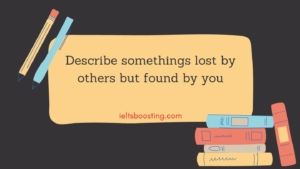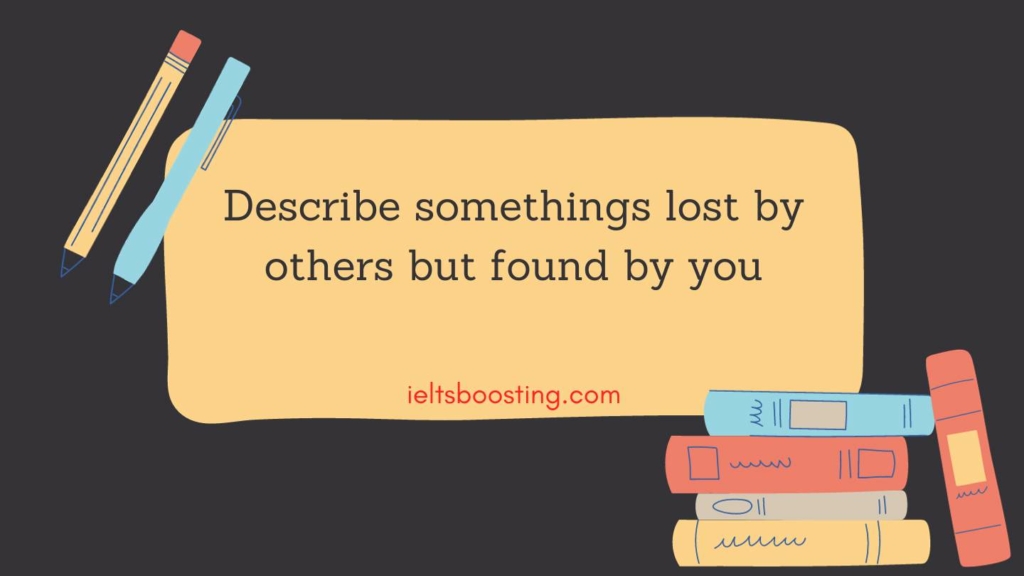Describe somethings lost by others but found by you
You should say
- What it was
- When and Where did you find it
- What you did do after you found it
- And explain how you felt about finding it
Sample answer
When I was a child, I had an experience that left a lasting impression on me. While I was playing in the park near my house, I found a small leather wallet. It was a sunny afternoon and the park was quite crowded with people enjoying the pleasant weather. The wallet was lying on the ground near a bench, seemingly forgotten by someone.
The wallet was black and made of genuine leather. When I opened it, I found some cash, a few credit cards, and an ID card. The ID card had a photo and the name of the owner, but no contact information.
After finding the wallet, I felt a mix of surprise and concern. I knew I needed to find the owner because losing a wallet can be very troublesome. I decided to take the wallet to the local police station. They have more resources and experience in handling such matters. The officers commended my actions and took down my details, promising to do their best to locate the owner.
I felt relieved after handing over the wallet to the police. I was glad that I could play a part in reducing someone’s stress. It was a small act, but it reminded me of the importance of honesty and helping others in our daily lives. This experience also taught me the value of community and the role each of us plays in supporting and looking out for one another
Useful vocabulary and collocations
| English Word | Word Form | Vietnamese Translation | Example Sentence |
|---|---|---|---|
| Wallet | Noun | Ví | I found a small leather wallet in the park. |
| Genuine | Adjective | Thật, chính hãng | The wallet was made of genuine leather. |
| Cash | Noun | Tiền mặt | When I opened it, I found some cash. |
| Credit Card | Noun | Thẻ tín dụng | There were a few credit cards in the wallet. |
| ID Card | Noun | Thẻ căn cước/Chứng minh thư | There was an ID card in the wallet. |
| Contact Information | Noun | Thông tin liên lạc | The ID card had no contact information. |
| Surprise | Noun | Sự ngạc nhiên | After finding the wallet, I felt a mix of surprise and concern. |
| Troublesome | Adjective | Phiền toái | Losing a wallet can be very troublesome. |
| Police Station | Noun | Đồn cảnh sát | I decided to take the wallet to the local police station. |
| Relieved | Adjective | Cảm thấy nhẹ nhõm | I felt relieved after handing over the wallet to the police. |
| Honesty | Noun | Sự trung thực | It reminded me of the importance of honesty. |
Forecast speaking from 1-4 2024

Describe somethings lost by others but found by you
Part 3-Describe somethings lost by others but found by you
Why do some people like to collect old things?
Some people are really into collecting old things, and I think there are a few reasons for that. First off, for a lot of collectors, it’s about the nostalgia, like holding onto a piece of history or reliving memories. Then there’s the rarity and uniqueness of old items, which you just can’t find with modern stuff. Plus, I guess for some, it’s like a treasure hunt, finding these rare gems in flea markets or antique shops. It’s pretty cool when you think about it.”
Useful Vocabulary:
- Collecting: The act of gathering items of a particular kind.
- Nostalgia: A sentimental longing for the past.
- Piece of history: Something that represents a historical period or event.
- Reliving memories: Experiencing past moments again.
- Rarity: The state or quality of being rare or unique.
- Uniqueness: The quality of being one of a kind.
- Modern stuff: Contemporary or recent items.
- Treasure hunt: The activity of searching for valuable or interesting items.
- Rare gems: Uncommon and valuable items.
- Flea markets: Outdoor markets selling second-hand goods.
- Antique shops: Stores specializing in old and collectible items.
Formal version
People collect old things for various reasons. For some, it’s the historical significance that attracts them; they feel like they are owning a piece of history. Others enjoy the aesthetic appeal of antiques, which often have intricate designs and craftsmanship absent in modern items. Then there’s the investment aspect – many old items appreciate in value over time, making them not just collectibles but also assets. Finally, collecting can be a very personal hobby, connecting people to certain times, places, or even family heritage
Will children take possession of things they pick up?
Kids and their habit of grabbing stuff they find? Yeah, it happens a lot. Little ones are like mini explorers, you know, always curious and wanting to check out everything they see. They don’t really think about whether it’s theirs or not, they’re just fascinated by new things. But, of course, it’s important for us, the adults, to step in and teach them about what’s okay to take and what’s not, and the whole idea of personal belongings and respecting others’ property.”
Useful Vocabulary:
- Mini explorers: A playful way of describing children’s natural curiosity.
- Curious: Eager to know or learn something.
- Fascinated: Strongly attracted and interested.
- Step in: To become involved in a situation.
- Personal belongings: Items that belong to a specific person.
- Respecting: Showing consideration for.
- Property: Things owned by someone.
- Habit: A regular tendency or practice.
Formal version
Children often take possession of things they pick up, especially at a young age, due to a natural sense of curiosity and discovery. They might not fully understand the concept of ownership or that the item belongs to someone else. This behavior is part of their learning process, where they explore and interact with the world around them. However, it’s important for adults to guide them in understanding ownership and respecting others’ belongings.
How should parents educate them?
Parents should educate their children about ownership and respect for others’ belongings through consistent guidance and leading by example. It’s important to explain to kids, in simple terms, the difference between what’s theirs and what belongs to others. Role-playing scenarios can be a great tool to teach these concepts, as it helps children understand in a practical, hands-on way. Encouragement and positive reinforcement when they respect others’ property can also be effective in instilling these values.”
Useful Vocabulary:
- Ownership: The act of owning something.
- Respect: Admiration felt or shown for someone or something.
- Consistent guidance: Regular and steady direction or advice.
- Leading by example: Demonstrating behavior through one’s own actions.
- Role-playing scenarios: Acting out situations to simulate real-life experiences.
- Practical: Involving real situations and events.
- Hands-on way: Involving active participation.
- Encouragement: Giving support, confidence, or hope.
- Positive reinforcement: Rewarding a behavior to encourage its recurrence.
- Instilling values: Gradually imparting ideas or attitudes.


